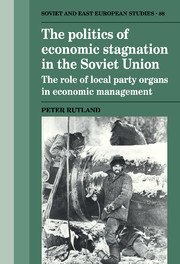 The Politics of Economic Stagnation in the Soviet Union
The Politics of Economic Stagnation in the Soviet Union Book contents
- Frontmatter
- Contents
- List of tables
- Preface
- Glossary of Russian terms and abbreviation
- Introduction: The party in the post-totalitarian system
- 1 The party and the economy: structures and principles
- 2 Party interventions in industry
- 3 Interventions in industry: case studies
- 4 The party as regional coordinator
- 5 Regional coordination: case studies
- 6 The party as fireman: party interventions in the transport and energy sectors
- 7 The role of the party in agriculture
- 8 Non-party control organs
- 9 The principles underlying the party's work with cadres
- 10 The obkom elite in the 1980s
- 11 Party and economy under perestroika
- Conclusion Party and economy in the USSR: from stagnation to collapse
- Appendices
- Notes
- Bibliography
- Index
- THE POLITICS OF ECONOMIC STAGNATION IN THE SOVIET UNION
7 - The role of the party in agriculture
Published online by Cambridge University Press: 06 July 2010
- Frontmatter
- Contents
- List of tables
- Preface
- Glossary of Russian terms and abbreviation
- Introduction: The party in the post-totalitarian system
- 1 The party and the economy: structures and principles
- 2 Party interventions in industry
- 3 Interventions in industry: case studies
- 4 The party as regional coordinator
- 5 Regional coordination: case studies
- 6 The party as fireman: party interventions in the transport and energy sectors
- 7 The role of the party in agriculture
- 8 Non-party control organs
- 9 The principles underlying the party's work with cadres
- 10 The obkom elite in the 1980s
- 11 Party and economy under perestroika
- Conclusion Party and economy in the USSR: from stagnation to collapse
- Appendices
- Notes
- Bibliography
- Index
- THE POLITICS OF ECONOMIC STAGNATION IN THE SOVIET UNION
Summary
A single chapter cannot do more than scratch the surface of the subject of Soviet agriculture and the role of the CPSU in the rural economy. However, the party's role in industry simply cannot be understood without giving some attention to its deep involvement in agriculture.
J. Hough himself did not attempt to incorporate agriculture into his model of the obkom first secretary as prefect, but at several points he noted that ‘local party officials have been greatly tempted to neglect industry in order to have more time to devote to agriculture’, and that ‘for many years the greatest danger for the obkom first secretary has arisen from the agricultural sector’.
This chapter will briefly review the status of agriculture and its importance for the CPSU, then map the shifting pattern of institutions through which the sector was managed from the 1960s to the 1980s. After examining the role played by party organs, three brief case studies will be presented: party campaigns to promote livestock rearing and elevator construction, and industrial sponsorship of farms.
Agriculture and the Soviet economy
The party's dominant role in farming went back to the collectivization campaign of 1929–32, which undermined the traditional structures of village life and left local party officials with the task of bringing the countryside into the domain of the Soviet economy. What transpired was something resembling a process of ‘primitive socialist accumulation’, with food and labour being pumped out of the countryside to fuel the industrialization drive.
- Type
- Chapter
- Information
- The Politics of Economic Stagnation in the Soviet UnionThe Role of Local Party Organs in Economic Management, pp. 142 - 163Publisher: Cambridge University PressPrint publication year: 1992


